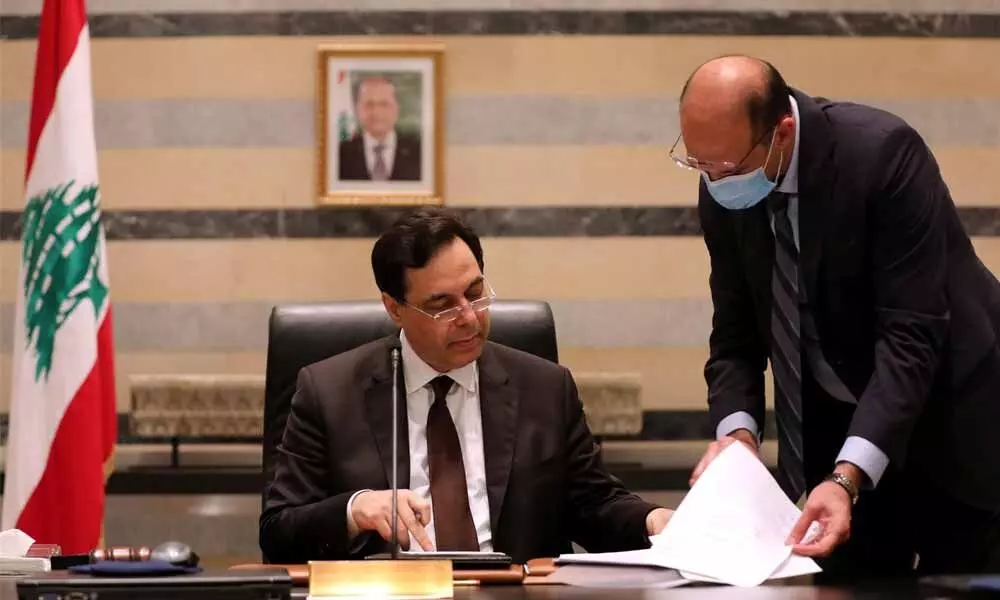Live
- MP's Gita recitation programme finds place in Guinness World Records
- Pawan Kalyan Shines Globally as 2nd Most Googled Actor of 2024 Amid Busy Film, Political Career
- Disruptor of House is the chairman himself: Cong and INDIA bloc’s pointed remarks on No-trust notice
- IIIT-Bangalore to host computer vision conference ICVGIP 2024
- F1: Fernando Alonso ‘still dreaming’ of third world championship
- WI vs Bangladesh Watch Controversial Banter Between Shakib and King
- EFLU Celebrates Bharatiya Bhasha Diwas
- Manchu Manoj Submits Bond of Rs. 1 Lakh to Rachakonda Commissioner
- Cuba denounces US 'theft' of Havana Club rum trademark
- Places of Worship Act: Mathura Shahi Eidgah mosque files intervention application in SC
Just In
Lebanon health minister: Cabinet resigns over Beirut blast


Lebanon health minister: Cabinet resigns over Beirut blast
Lebanon's Cabinet has resigned over last week's devastating blast at the Beirut port, the health minister said, a decision that was made under pressure as several ministers quit or expressed their intention to step down.
Beirut: Lebanon's Cabinet has resigned over last week's devastating blast at the Beirut port, the health minister said, a decision that was made under pressure as several ministers quit or expressed their intention to step down.
The minister, Hamad Hassan, spoke with reporters at the end of a Cabinet meeting on Monday, which came after two days of demonstrations over the weekend that saw clashes with security forces firing tear gas at protesters. "The whole government resigned," Hamad said. He added that Prime Minister Hassan Diab will head to the presidential palace to "hand over the resignation in the name of all the ministers." The massive blast on Aug. 4 which decimated Beirut port and devastated large parts of the city has brought a new wave of public outrage at the government and Lebanon's long-entrenched ruling class.
Protests were planned outside the government headquarters to coincide with the Cabinet meeting after large demonstrations over the weekend that saw clashes with security forces firing tear gas at protesters. The explosion is believed to have been caused by a fire that ignited a 2,750-ton stockpile of explosive ammonium nitrate. The material had been stored at the port since 2013 with few safeguards despite numerous warnings of the danger. The result was a disaster Lebanese blame squarely on their leadership's corruption and neglect. The blast killed at least 160 people and wounded about 6,000, in addition to destroying the country's main port and damaging large parts of the capital. Losses from the blast are estimated to be between USD 10 billion to USD 15 billion, and nearly 300,000 people were left homeless in the immediate aftermath. Prime Minister Diab was expected to address the nation later Monday.
His Cabinet now assumes caretaker role until a new government is formed. A Lebanese judge on Monday began questioning the heads of the country's security agencies. Public Prosecutor Ghassan El Khoury questioned Maj. Gen. Tony Saliba, the head of State Security, according to state-run National News Agency. It gave no further details, but other generals are scheduled to be questioned. State Security had compiled a report about the dangers of storing the material at the port and sent a copy to the offices of the president and prime minister on July 20. The investigation is focused on how the ammonium nitrate came to be stored at the port and why nothing was done about it.
About 20 people have been detained over the blast, including the head of Lebanon's customs department and his predecessor, as well as the head of the port. Dozens of people have been questioned, including two former Cabinet ministers, according to government officials. Meanwhile, Justice Minister Marie-Claude Najm on Monday handed in her resignation, the third Cabinet minister to resign over the blast. She felt the brunt of protesters' anger when she tried to visit a damaged neighborhood and was met by shouted insults, sprayed by water hoses and forced to leave. If a total seven ministers of the 20 Cabinet ministers resign, a new government must be formed. At least nine members of parliament have also resigned.

© 2024 Hyderabad Media House Limited/The Hans India. All rights reserved. Powered by hocalwire.com






